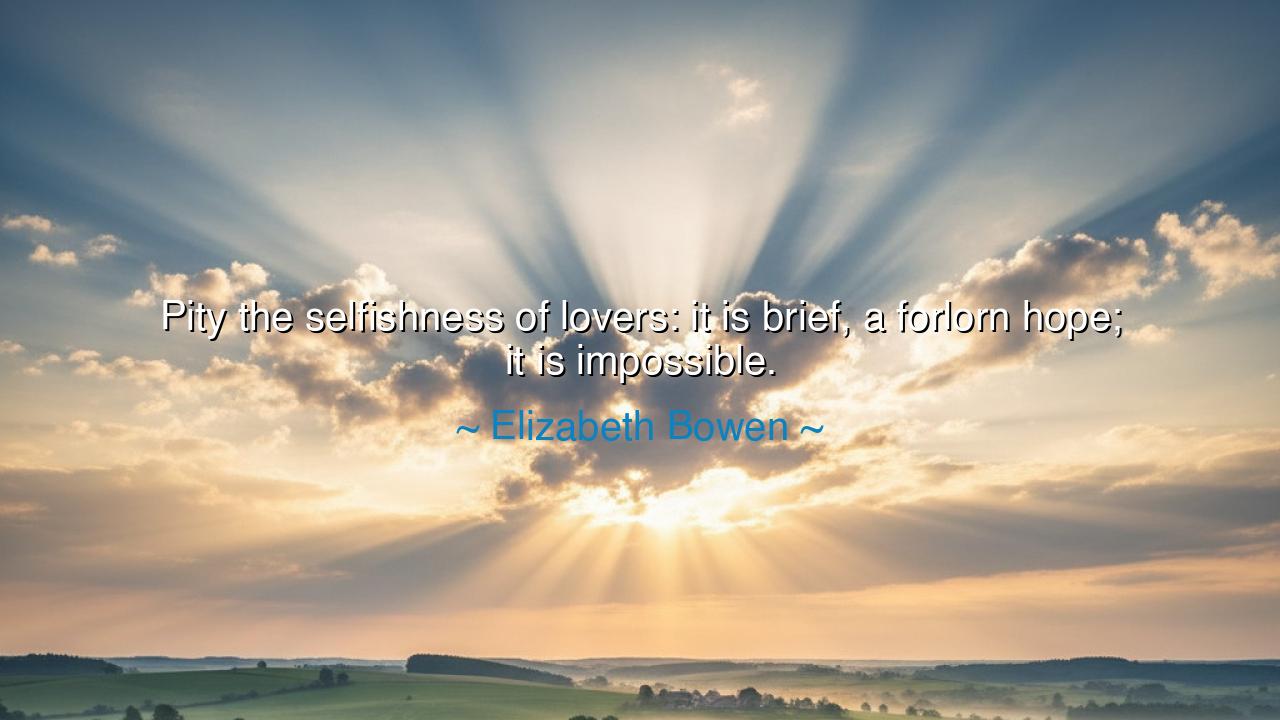
Pity the selfishness of lovers: it is brief, a forlorn hope; it






In the hush between two heartbeats, the ancients would counsel us to pity the selfishness of lovers. For when desire curls inward, clutching only what it craves, the union starves of air. The breath of love is gift and return; to hoard it is to suffocate the very flame one seeks to warm. Bowen’s line names this irony without ornament: the private hunger that calls itself love soon becomes a withering, not a blooming. It is brief, not because passion lacks fire, but because a hand clenched tight cannot receive.
The phrase “a forlorn hope” is the banner of besiegers—soldiers sent first against the wall, brave and nearly doomed. So too with possessive love: it must storm another’s mystery while fearing their freedom, and thus it breaks itself upon the ramparts of the beloved’s will. To chase ownership is to mistake nearness for union, and conquest for intimacy. The garrison might be taken for a night, but morning reveals the ruins: suspicion, small silences, the tired accounting of who gave more.
Then comes the hardest clause: “it is impossible.” Not love itself—never that—but the fantasy of love as private dominion, as a kingdom with one throne and one kneeling subject. True love is a republic of two souls, not an empire of one. The self-absorbed ardor cannot last because it contradicts the nature of love, which is outbound, generative, like a river insisting upon the sea. What refuses to flow will stagnate; what refuses to share will spoil; what refuses to trust cannot be kept.
Consider the tale of Antony and Cleopatra. Two sovereigns, splendid and fierce, who tried to bend the world to the gravity of their bond. Their romance, luminous as desert noon, became a chamber with sealed windows—campaigns delayed, duties deferred, a realm’s good bartered for private nights. For a season their joining promised to swallow empire; yet their inward turning proved a forlorn hope, and Actium’s winds scattered it. The brief triumphs of appetite could not withstand the long reckonings of history; their passion, magnificent and narrow, met the impossible task of making the world small enough for two. And so, like all sieges against reality, it failed.
Look also to humbler lives. I have seen a pair in an ordinary town pledge exclusivity so tight that friends fell away, callings dimmed, and each measured tenderness as a scarce coin. Each kindness demanded change. Each gift asked a receipt. Their house grew quiet, then brittle. One day a simple invitation—a sibling’s wedding—became a referendum on loyalty. Suspicion declared victory; love declared bankruptcy. The relationship ended not with betrayal but with accounting: the ledger of grievances finally balanced to zero. Pity that arithmetic; love is solved by music, not by math.
Where, then, is Elizabeth Bowen pointing us? The line comes from The Death of the Heart (1938), a book steeped in the chilly commerce of feelings and the fragile economies of giving and keeping. Bowen watched the modern heart walk through salons of irony and houses of withheld warmth; she knew that a love hoarded becomes a love impoverished. Her sentence is not a curse upon lovers, but mercy upon them: see what cannot work, she says, and choose what can—attention, generosity, the patient relinquishment of control.
The lesson for us is stern and tender: love that orbits only the self dies of its own gravity. Therefore train your heart in the ancient disciplines—listen until you hear more than your need; give until the gift no longer keeps score; speak truth in the smallest weather of the day; let your beloved remain a sovereign mystery. Practice three actions: (1) once each day, offer a kindness that costs you comfort and earns you nothing; (2) once each week, ask, “What would make your load lighter?” and do that thing without delay; (3) in each quarrel, surrender one needless demand. These are small gates through which great caravans pass.
And finally, carry Bowen’s cadence as a charm against confusion. When you feel love shrinking into possession, whisper her words—pity, selfishness, lovers, brief, forlorn hope, impossible—not to despair, but to awaken. For beyond the impossibility of selfish love lies the wide plain of the possible: a love that keeps vigil instead of score, that seeks the good beyond the mirror, that learns, with reverent courage, to open its hand. Only then does the heart survive its death—and rise.






AAdministratorAdministrator
Welcome, honored guests. Please leave a comment, we will respond soon